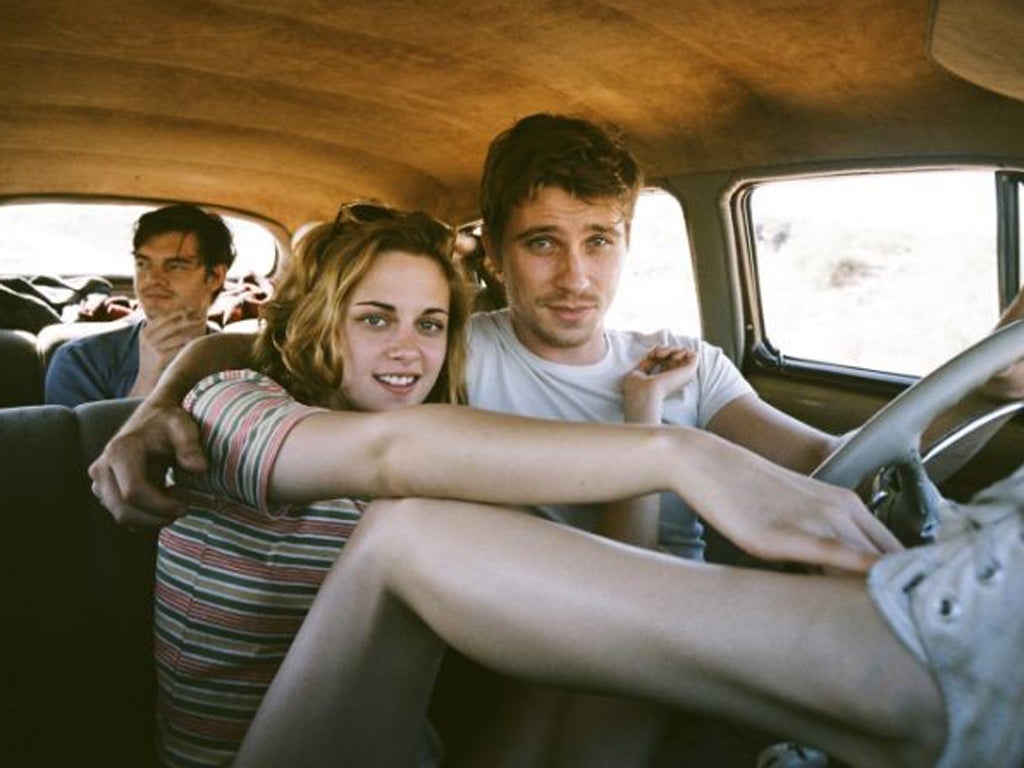On the Road, Walter Salles, 124 mins (15)
Walter Salles has gone where others feared to tread: in Kerouac's footsteps. It is a tough ask

Jack Kerouac's 1957 Beat narrative On the Road belongs in a long line of attempts to tame the American continent. Instead of seeing the US as a sprawling land mass populated by authority figures hostile to youth, his book told a post-war generation that it was one permanent party out there; wherever you went, from Des Moines to Denver, there would be drink, drugs, sex and jazz among kindred spirits, people who "burn, burn, burn like fabulous yellow Roman candles …".
Long considered unfilmable, On the Road is at last on the screen, executive-produced by Francis Ford Coppola, who once planned to direct, and now helmed by the Brazilian Walter Salles. The adaptation, scripted by José Rivera, takes a realist, de-mythifying tack. It highlights the film's central love triangle between narrator and Kerouac surrogate Sal Paradise (Sam Riley), quasi-hobo Dean Moriarty (Garrett Hedlund) and Moriarty's teenage wife, Marylou (Kristen Stewart). No, make that a love pentagon, adding Moriarty's other woman, Camille (Kirsten Dunst), and manic poet Carlo Marx (Tom Sturridge), based on Allen Ginsberg and hopelessly enamoured of Dean. In fact, everyone's mad about the priapic, polysexual Moriarty, not least himself.
Photographs of Kerouac and his friend Neal Cassady, the model for Dean, show men much more weathered than Riley and Hedlund – even young, they resembled battered prizefighters. But the people in the book and the film aren't Jack and Neal, they're the fictional Sal and Dean, and it's proper that the film emphasises restless youth. The cost is that their screen incarnations feel callow: Riley, so striking as Ian Curtis in Control, is an oddly vacant dreamer, and Hedlund a hunky surfer pin-up.
The women here figure rather more as living people, not least because of the script's critical slant on the maleness of Kerouac's world: in one pointed scene, they scrub floors while Old Bull Lee (the William Burroughs figure played by Viggo Mortensen) holds forth about his literary obsessions. As Marylou, Stewart – several rough motorway mornings away from the pieties of Twilight – manages to resist the camera's tendency to frame her as a pair of gangly legs on a back seat, especially in a very close-up scene in which when she responds deeply to a broken-hearted love song. But Dunst's canny Camille, who knows she's wasted herself on a lunk, is a much tougher presence, and the one who ends up giving Dean a bitter dressing-down.
Odd moments make you squirm, though it's hard to tell whether Salles intends this. In one sequence, Sal takes up with a single mother and joins her among the itinerant workers picking cotton; when the season's over, he moves on, and it looks horribly like the proverbial cheap holiday in other people's socio-economic reality. As for the Mexican sojourn mambo-ing in a brothel, the boys really start to come across as Ugly Americans; I'm not sure whether Salles is being satiric here, or whether the film has just lapsed into ay caramba tourist mode.
There are some memorable but unobtrusive turns along the way: Steve Buscemi is a square who gets serviced by Dean; Amy Adams and Elisabeth Moss both have brisk cameos at the Lee household; and Mortensen steals the show with a perfect Bill Burroughs drawl, dropping his pants to visit his backyard "orgone accumulator".
Director Salles has some form as a peripatetic director, having followed Che Guevara's trail in the rather more interesting Motorcycle Diaries. On the Road is not without poetry or beauty, and those mountain vistas and rain-splattered windshields (shot by Eric Gautier) are irresistibly looka-yonder. But Salles always struck me as rather earnest in his poetry, an upmarket photojournalist among fiction directors. Precisely because the Beats partly created the idea of modern America, it's that much harder to evoke the newness of their experience, and this journey (some 15 minutes shorter since its debut in Cannes) ultimately feels a little draggy and familiar. Its richest poetry is in Gustavo Santaolalla's fabulously loose jazzy score. But the thrill and, above all, the marginality of the original are missing: this seems a little safe and groomed, like spring break in workshirts, an Abercrombie & Fitch odyssey. The Beat faithful won't feel betrayed by this honourable attempt; but while it's not a damp squib, it's no Roman candle.
Subscribe to Independent Premium to bookmark this article
Want to bookmark your favourite articles and stories to read or reference later? Start your Independent Premium subscription today.

Join our commenting forum
Join thought-provoking conversations, follow other Independent readers and see their replies